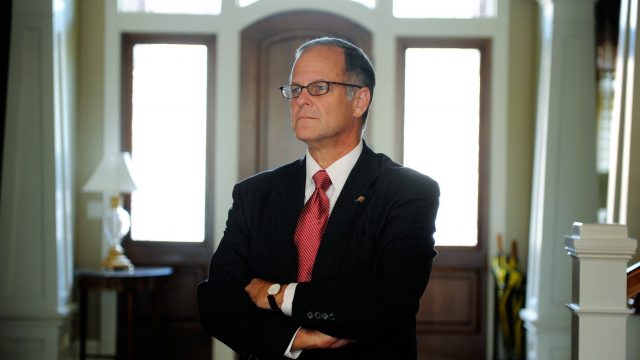Bresciani’s Open Records Travails Brought up During Ohio University Forum

Earlier this month we learned that embattled NDSU President Dean Bresciani was a finalist to be the next president of Ohio University. This news led to much garment-rending and gnashing of teeth from the myopic alumni and football fanatics who make up Bresciani’s political base of support.
If only those of us who expect honest and integrity (and a degree of competency) from public officials hadn’t been so hard on Bresciani he might not be setting sail for greener pastures in Ohio, their argument goes.
Whatever. I think Bresciani moving on, which seems inevitable at this point whether it’s Ohio or somewhere else, would be good for him and good for North Dakota.
Only, a forum Bresciani attended over in Ohio this week didn’t go so well for him when some of his past issues with North Dakota’s open records laws were brought up. Specifically, an incident where tens of thousands of emails just happened to disappear from Bresciani’s email account contemporaneous to an open records request for them from the Legislature.
Bresciani rather self servingly blamed the incident on sensationalism from local media:
Graduate Student Senate President Ian Armstrong questioned Bresciani about a controversial email situation during his time at NDSU.
In 2013, 45,000 emails were deleted from Bresciani’s inbox around the same time the North Dakota Legislative Council sought a wide swath of his email correspondence in an open records request.
Attorney General Wayne Stenehjem released an opinion later that year that said the system had violated open records law but not whether the deletion of the emails was intentional.
During Thursday’s forum, Bresciani denied any wrongdoing, claiming Stenehjem found no violation of law. He blamed local media for sensationalizing the story.
“I’m assuming you’re basing (the question) off media reports,” Bresciani said. “Our media is just as colorful as your media, and oftentimes higher education is an easy target.”
I’d argue that higher education is an “easy target” for those of us in the media because of public officials like Bresciani who give us so much to write and talk about.
As for that email scandal, I’d make two points as someone who covered it extensively.
First, the Attorney General’s opinion (you can read it here) did find that the law was violated. The emails should have been turned over to the Legislature, not deleted. The issue was whether or not the emails had been deleted purposefully by Bresciani (which would be a crime under state law). The AG’s opinion said they couldn’t conclude one way or another.
[mks_pullquote align=”left” width=”300″ size=”24″ bg_color=”#ffffff” txt_color=”#000000″]Bresciani’s combative attitude toward the Legislature and other state officials – not to mention his often duplicitous dealings with them – has earned him their enmity.[/mks_pullquote]
It’s worth noting that at least one other university system employee has said, on the record, that she believes the emails were likely deleted on purpose and that the university system tried to cover it up.
Second, what’s perhaps more damning for Bresciani than the suspicious deletion of his emails – whether intentional or not – is why the Legislature was requesting tens of thousands of his emails in the first place.
Put simply, Bresciani’s combative attitude toward the Legislature and other state officials – not to mention his often duplicitous dealings with them – has earned him their enmity. As a case in point, back in 2014 state Rep. Bob Martinson, a Republican from Bismarck, said this to me: “Either Dean Bresciani went to the Lois Lerner school of email management, or she went to the Dean Bresciani school, but either way they’re both honored graduates.”
(Lerner, of course, is the Obama administration IRS official who rather infamously couldn’t locate her emails.)
“There’s no doubt in my mind that those emails were deleted on purpose,” Martinson went on to tell me about incident brought up in Ohio. He was speaking in the context of Bresciani resisting the integration of NDSU’s email system into one created for the state’s entire university system. “The reason why NDSU wants their own system is so that they don’t have to respond to email requests.”
Martinson’s attitude about Bresciani’s honest and integrity is not at all uncommon among state lawmakers, and it’s born of more than just conflicts over email. Even many of Bresciani’s supporters will acknowledge, grudgingly and in private, that the man is a difficult person to work with.
If I were the person in charge of hiring over at Ohio University that would concern me deeply.
And I say that as someone who very much wants Dean Bresciani to move to Ohio, if only because it would create an opportunity for the North Dakota University System to find a better sort of leader for NDSU.




